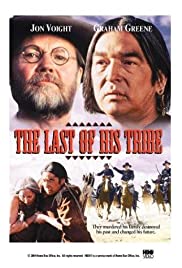
THE LAST OF HIS TRIBE
US, 1992, 91 minutes, Colour.
Jon Voight, Graham Greene, David Ogden Stiers, Jack Blessing, Anne Archer, Daniel Benzali.
Directed by Harry Hook.
Ishi, played by Graham Greene, is the last of the Yahi native Americans who lived in what became the state of California. This film is based on actual events and characters.
In 1911, Ishi was wandering the countryside, hungry, going into an abattoir and confronted by the owners. However, he is recognised as a Native American and handed over to the authorities. The difficulty is communication, the first authority, Thomas Waterman (Jack Blessing) does not have the vocabulary but makes contact with Prof Alfred Koebler who has several languages and is able to recognise Yahi words. Contact is made. The Professor is played, in a very restrained and academic style, by Jon Voight.
The film is mainly about Ishi and his survival, his being embraced by the white community and culture, his adaptation, his wanting to live his life in the community, the professor refusing to allow him to be relegated to a reservation, employing him as an assistant in the Museum the professor curates.
There are many of the expected situations, English words and cards for learning, issues of clothes and shopping, food, settling into a room… There is also a visit to Dr Pope, a rather exuberant type with a love of archery, in admiration for Ishi’s physical health and condition. The Professor decides to go on an expedition with Waterman, the doctor (with the promise of archery and hunting) and Ishi to find the land where Ishi lived (with flashbacks to the invasion of the shooters, the massacre, Ishi’s survival with his sister and mother). This offers Ishi the opportunity for some heartfelt lament for the dead.
The Profesor’s life is complicated by the illness of his sympathetic wife, Henrietta (Anne Archer) and her death, Ishi amazed at the reticence of the funeral and wake, no singing so that the deceased could go on the trail of the dead to the future life. The Profesor decides to take up a position managing a Museum in New York, farewelling Ishi, learning that he had contracted consumption and then dying, the professor telegraphing that there should be no autopsy, respecting Ishi’s body – but it is too late.
For dramatic ending to this story, the Professor in grief begins to sing the chant that he learned from Ishi.
1. Based on a true story? Native American Indians? Their life in the 19th century, extermination? The story of the Lone Survivor?
2. 1911, California, all museums, exhibits, technology, motor vehicles, lighting?
3. The introduction to Issue, wandering onto the property, in the abattoir, the men confronting him, recognising him?
4. Ishi as a man, his age, the revelation that he was the last of the Yahi? With the authorities, the experts, the attempted language, his not recognising words? Profdsor Kroeber, his communicating with Ishi, recognition?
5. The flashbacks, issue and his story, the shooters coming, the massacre, the grief, Ishi and his sister and mother, survival, their deaths? his wandering? Not wanting to return to the site? The eventual return, his memories, the occasion for grief, for singing, vaunting his ancestors to be on the death Trail?
6. Jon Voight as the professor, academic, restraint, his personal life, love for his wife, her illness, his being in denial about the illness, the impact of her death? His work, knowledge, the museum, his staff?
7. The professor taking on Ishi, language and communication, English words, cards and images and words, clothes, no shoes?
8. The effect on Ishi, his saying that he wanted to live in this new world, adapting, his room, food, language? The authorities wanting him to go on to a reservation? The professor employing him as staff? Ishi and his liking his work?
9. Dr Pope, hail-fellow-well-met, examining Ishi, admiration for his physical condition, the cast of his foot? His jokes? Archery?
10. The professor wanting to go back with Ishi, to get artefacts, to understand, Tom as his assistant, loyal, working with Ishi? The trek, Dr Pope, the hunting of the deer? Dr Pope and his singing, the contrast with Ishi and his behaviour, his grief? The return?
11. The professor, Ishi coming to the meal at the house, Henrietta asking the questions? The offer to go to New York, administering the Museum, tempted? His sense of failure with Ishi after the expedition, going to New York, the brief farewell?
12. The professor, the success of his work in New York? The news of Ishi’s illness, consumption, Ishi is death? The telegram that they not be an autopsy, too late?
13. The professor silent at his wife’s death, Ishi asking why he did not seem? The finale and the professor singing in grief for Ishi?
14. The film as a drama, an unusual friendship, white culture and the encounter with Indian culture, learning and not learning? The anthropological interest of the film?